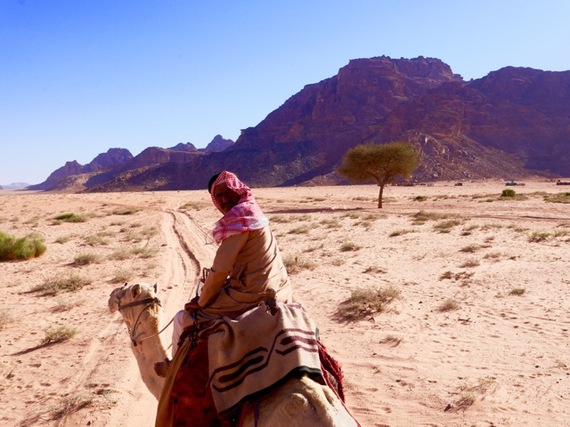By Lily Lousada
Strict Bedouin legal codes often overpower civil law in Jordan, drawing the state's most basic sovereignty into question. To this day honor killings, revenge killings, and forced displacements occur frequently and often without official legal proceedings. In order to ensure internationally recognized human rights and uphold the constitution, the justice system requires structural reform. Jordan should work towards institutionalizing these informal practices by codifying customary tribal law into a legally pluralistic system that aims to respect, and regulate, long-standing principles of tribal justice and traditions of arbitration.
There are three main court systems in Jordan: civil, religious, and military. Tribal law, though rampantly in use, remains informal since its abolishment in 1976. Customary tribal or Bedouin law is predominantly organized around clear reactions to disturbances of social order and family honor. It runs parallel - and at times in direct opposition to - Jordanian civil code.
Besides a monopoly of the use of force, rule of law is a theoretical cornerstone of 'sovereignty.' It would therefore appear that the active presence of such self-governing practices undermines the state. Yet, legal pluralism - formal or otherwise - is not necessarily symptomatic of a weak state. The challenge comes in integrating and applying pluralism in a way that recognizes long-standing alternative notions of justice and yet creates and upholds a fair system for all.
The United States, Canada, and Australia for example, all maintain customary bodies of law governing indigenous populations: Federal Indian law, Canadian Aboriginal Law, and Australian Customary Aboriginal Law, respectively. As a result, there is strong precedent and significant pre-existing discourse on reconciling multiple legal systems - the Australian Human Rights Commission for example, continues to consult with top international legal scholars to address the unique challenges of legal pluralism and indigenous law.
Informal legal pluralism is already in practice in Jordan. Frequently police act to contain conflict, and then hand the issue over to the involved tribes to resolve the crime or move toward reconciliation. In January of this year, for example, the gendarmerie was called into the northern Governorate of Irbid to control riots that had broken out as a result of a 14-year-old boy being fatally shot by his neighbor. According to the Jordan Times, Irbid Police Department Director Brig. Gen. Ali Hamlan stated "no one was injured in the [riot] fires because the families of the suspect were evicted to a remote location based on tribal laws [jalwa]". This is just one example of the common, unofficial collaboration between state and tribes.
Jalwa, one of the more striking contemporary practices of Bedouin law, is the forced relocation of a clan to protect against revenge killings in the case of pre-meditated murder or rape between two neighboring tribes. Jalwas are usually reached through third party arbitration of a ceasefire, atwa, and negotiations by a perceived neutral authority, such as another tribe's sheikh.
Atwas illustrate a practice in which government and tribes sometimes more formally merge authority and legal codes. In January 2016, for example, there was a direct state-sponsored atwa, resulting in a large jalwa. The atwa delegation was led by the Deputy Prime Minister and Minister of Education Mohammad Thneibat, and guaranteed the victim's family's conditions, including, as the Jordan Times reported, "sentencing the killer to death, dropping the right of the suspect to hire a defense lawyer, evacuating the suspect's tribe (all those related to the suspect through the fifth paternal ancestor) and giving the victim's clan the right to kill the perpetrator's father, children, grandchildren, uncles, and their children if they pass by Mutah town at any time."
This practice violates a number of international human rights, as well as elements of the Jordanian constitution. The government has made small efforts to limit jalwas, such as to only apply them to the immediate family for example, but these efforts have been met with only varied success. Ironically, much of the progress in limiting jalwas that has been achieved has relied on tribal code, such as the honor pact in Salt.
Furthermore, if a case involving tribesmen does reach a civil or religious courthouse, the long-established notions of tribal justice are still likely to influence the ruling - as seen with reduced sentences at the victim's family's request for leniency - if not altogether pre-determine it. The idea that tribal power opens flexibility in the legal system, where court rulings go from firm decision to negotiation, is an undeniable degradation of the rule of law - and perhaps even state sovereignty. But, if codified correctly, the presence of these two systems of justice does not have to be a weakness.
To integrate and institutionalize tribal customary law into Jordan's civil and religious codes requires rigorous, transparent, and continued dialogue to account for the special set of legal considerations - the most basic of which is equality - that comes with legal pluralism. Extensive outreach and consultation with local communities would also be necessary. While the government has worked to improve the existing justice system, it has thus far failed to make the necessary structural reforms. It is time for Jordan to step up and engage in deep and open dialogue as a first step to increasing transparency and finding a sustainable way to reconcile the existing systems to better protect basic human rights and uphold the constitution.
Lily Lousada is based in Amman, Jordan where she works on conflict mitigation, socio-political stability, and governance development. She also serves as a Middle East Fellow at Young Professionals in Foreign Policy.
Image Credit: Lily Lousada

